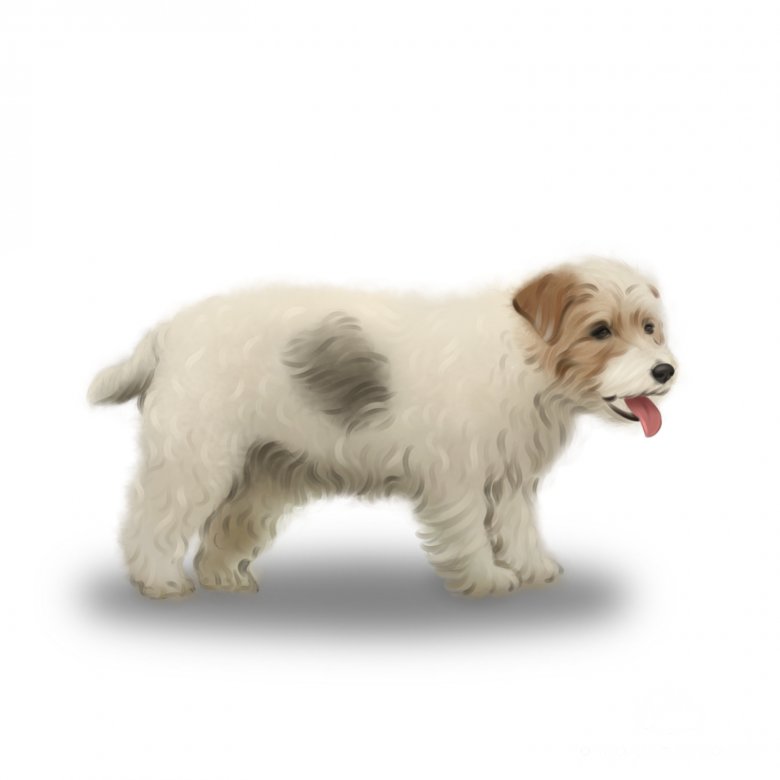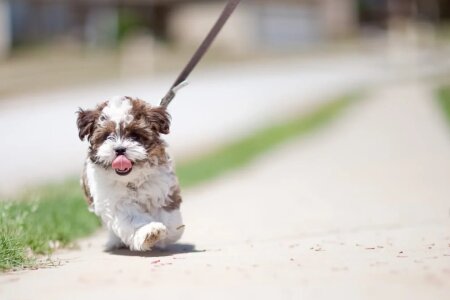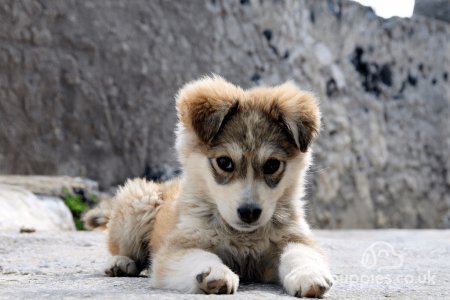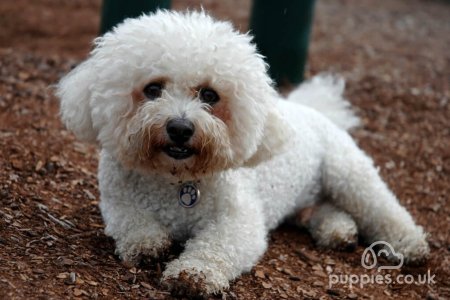Sporting Lucas Terrier
Overview
Although the Sporting Lucas Terrier may not be as well-known as other terrier breeds, he is nevertheless a loving and adorable little companion full of confidence and sure to make owners and their families smile.
This terrier breed from Scotland is a perfectly suitable choice for owners looking for a terrier that is less demanding, calmer, and more affectionate. Their adorable looks (especially as puppies) and their mild temperament make them perfectly suitable for first-time owners and owners living a more sedentary lifestyle.
Physical Appearance
Sporting Lucas Terriers are a small-sized breed with a robust musculature and sturdy appearance for their size. They resemble in many ways other terriers, of course.
Small, oval eyes deeply set and spread far apart on the face give an impression of affection, curiosity, and alertness. Their ears are set high and droop forwards in a V-shape. Their tails are relatively short but are carried upwards, sometimes in a curl as they move.
Their short, wiry coats come in two main colour combinations: white with brown or grey markings; all-black or black with tan markings.
This breed most closely resembles its direct cousin, the Lucas Terrier, and to a lesser extent the Jack Russell Terrier, Fell Terriers, and perhaps the Miniature Schnauzer.
How big do Sporting Lucas Terrier dogs get?
Character Traits
The temperament of the Sporting Lucas Terrier can perhaps best be described as friendly, confident, and sweet-natured. It is important to note, however, that despite being a terrier breed the Sporting Lucas Terrier is quite a different breed altogether when it comes to typical temperament.
Whereas most other terriers have a knack for being hyperactive and strung out on high energy that needs constant satiation, the Sporting Lucas Terrier is a little more laid back and relaxed. Another key distinction is their barking. Most terriers tend to bark excessively, but the Sporting Lucas Terrier, while still yappy at times, tends to only bark when necessary rather than “whenever he feels like it.”
Moreover, Sporting Lucas Terriers are known to be somewhat intelligent, independent at times, and easy to train. All are great characteristics for a prospective owner.
Are Sporting Lucas Terrier dogs intelligent? Not, not very intelligent.
Are Sporting Lucas Terrier dogs affectionate? Yes, exceptionally.
Do Sporting Lucas Terrier dogs have high or low energy levels? High energy.
Are Sporting Lucas Terrier dogs loyal? Yes, very.
Are Sporting Lucas Terrier dogs playful? Yes.
Are Sporting Lucas Terrier dogs aggressive? No, but they are territorial and can be defensive.
Are Sporting Lucas Terrier dogs easy to train? Yes, very.
Are Sporting Lucas Terrier dogs good guard dogs? Somewhat, they are reasonable watchdogs but perhaps not the best guard dog breed.
Ability to Socialise
As an even-tempered and relatively calm breed, Sporting Lucas Terriers have a reasonably good capacity for socialisation and tend to get along fairly well with other pets and children in the home.
They are territorial and sometimes defensive, but rarely if ever show signs of aggression. This means that towards strangers, they may appear cautious at first. Around other pets, Sporting Lucas Terriers tend to get along well with smaller pets like cats, but they don’t tend to get along very well with other dogs in the home.
Do Sporting Lucas Terrier dogs get along with other pets? Yes, somewhat.
Do Sporting Lucas Terrier dogs get along with other dogs? No, not really.
Are Sporting Lucas Terrier dogs good with kids? Yes, somewhat.
Are Sporting Lucas Terrier dogs good with strangers? Yes, somewhat.
Lifestyle Suitability
This breed is highly suitable for first-time owners, and thanks to their wonderfully jovial yet calm temperament, they make wonderful companions for owners that live more peaceful, sedentary lives such as the elderly or handicapped individuals.
Despite their small size, however, they are not particularly well-suited for apartment living and thrive in homes, particularly with fenced-off gardens whereby they can roam and play whilst under supervision. Like many other terrier breeds, they have a knack for digging into whatever they find, which could include your beloved flowerbeds or garden, so it’s important to reward good behaviour whilst also keeping them supervised during playtime.
It is important to recall that this breed is territorial and will claim your home as his territory. He will be just fine left on his own for a little while, but never for too long as this can promote naughty behaviour such as chewing, nipping, or as mentioned, digging up gardens.
Are Sporting Lucas Terrier dogs good for first-time owners? Yes.
Are Sporting Lucas Terrier dogs hypoallergenic? No.
Are Sporting Lucas Terrier dogs prone to drooling? Not too much.
Are Sporting Lucas Terrier dogs a good breed for apartment living? Not at all.
Do Sporting Lucas Terrier dogs shed a lot? Yes, they shed moderately throughout the year.
Do Sporting Lucas Terrier dogs bark a lot? Sometimes, but they tend to only bark when necessary.
Can Sporting Lucas Terrier dogs be left alone at home? Yes, but only for a moderate length of time.
Can Sporting Lucas Terrier dogs handle the heat? Yes.
Can Sporting Lucas Terrier dogs handle cold temperatures? Yes.
Are Sporting Lucas Terrier dogs sensitive to loud noises? Yes.
General Health & Health Issues
Since this breed is not recognised by many major kennel clubs, information regarding health conditions can be somewhat difficult to find. Nevertheless, this breed is considered by many to be relatively healthy, perhaps ranked average amongst other breeds.
Some health problems they may face during development or from inheritance are fairly common to most breeds, which means that a qualified veterinarian shouldn’t have much of an issue diagnosing and treating whatever ailments may be afflicting your Sporting Lucas Terrier.
Some common problems include:
Ear infections: always inspect your Sporting Lucas Terrier’s ears (and eyes) for signs of infection and have them treated by your veterinarian;
Ectropion: if ever your Sporting Lucas Terrier’s eyelids begin to fold outwards (ectropion), it needs to be treated by your veterinarian;
Patellar luxation: stemming from an out of place patella (above the knee), this condition can lead to a limp gait or lameness of the leg.
How long do Sporting Lucas Terrier dogs live? - 14-15 years
Exercise & Play Time
Sporting Lucas Terriers are fairly high energy and require constant stimulation every day for about an hour or so. They are terriers, after all, which means they require mental and physical stimulation through energetic, vigorous playtime. It’s often said that a tired dog is a happy dog, and this certainly hits the nail on the head when it comes to exercising your Sporting Lucas Terrier.
This breed tends to enjoy hopping into the water for a good swim, especially when it’s hot outside. As with all puppies, introduce them gradually to the water at first to see how they react. It’s better to let them gradually explore it on their own rather than to risk traumatising them.
How much exercise does a Sporting Lucas Terrier dog need? - About 1 hour per day
Do Sporting Lucas Terrier dogs like water play? Yes, most love to go for a swim when it’s hot outside.
Nutrition & Feeding
As a small-sized breed, Sporting Lucas Terriers don’t really consume too much in their daily diet. This makes them relatively affordable and easy to feed, but it makes it equally important to choose a highly nutritious diet full of vitamins and minerals to promote good, healthy growth and development.
Owners that wish to choose an alternative diet for their Sporting Lucas Terrier, such as raw food or cold-pressed dog food should speak to a veterinarian to ensure that their dietary choice reflects their weight, age, and meets all of their nutritional needs.
Are Sporting Lucas Terrier dogs prone to weight gain? Yes, especially as they age.
How much should I feed a Sporting Lucas Terrier puppy? About 40-125g per day, in 1-2 sessions.
How much should I feed an adult Sporting Lucas Terrier dog? About 95-150g per day, in total.
Care & Maintenance
One popular reason why many owners love Sporting Lucas Terriers so much is that they’re relatively easy in terms of both grooming and emotional care. Having said that, they do shed quite a bit of hair throughout the year which will necessitate regular vacuum cleaning to keep your home tidy.
Emotionally, Sporting Lucas Terriers can tolerate some isolation, but it’s best to always have someone at home to accompany them.
- Grooming: once per week, brush through the short, wiry coat of your Sporting Lucas Terrier and remove any debris or dead hairs. Although professional grooming isn’t absolutely required, owners may find it beneficial nonetheless to have him groomed once per year.
- Emotional care: Sporting Lucas Terriers have a mild independent streak to them, meaning they can tolerate some periods of isolation, but this should never become habitual as they, like most other breeds, thrive on human interaction.
History of the Sporting Lucas Terrier
The history of the Sporting Lucas Terrier is well-documented. Sir Jocelyn Lucas, from whence the Lucas Terrier derives his name, first began breeding Lucas Terriers in the 1940s in Watford, England. These terriers were originally bred from Sealyham Terriers and Norfolk Terriers to produce a hardworking breed able to track and flush out small animals.
In the 1990s, however, Brian Plummer began breeding Lucas Terriers with Jack Russell Terriers and Fell Terriers in Scotland to produce a working terrier breed. Although there are many similarities with the Lucas Terrier, Lucas Terrier clubs and associations wanted nothing to do with Plummer’s Sporting Lucas Terrier and he subsequently create his own breed registry for this separate breed in the late 1990s.
Although the Sporting Lucas Terrier is not yet recognised by the Kennel Club, various clubs and associations worldwide such as the United Kennel Club and the Sporting Lucas Terrier Association have recognised this breed.
Interesting Facts About Sporting Lucas Terrier Dogs
The Sporting Lucas Terrier is officially recognised as a separate breed from the Lucas Terrier;
Unlike with most breeds, the historical record of the Sporting Lucas Terrier is well-documented;
asdf.
Getting a Sporting Lucas Terrier Puppy
Whilst Sporting Lucas Terriers are adorable little puppies, they remain somewhat unpopular perhaps due to their rarity here in the UK. We welcome all prospective owners to first read through our buying guide to ensure they adopt or purchase a Sporting Lucas Terrier from reputable breeders rather than puppy mills or unethical breeders.
How much does a Sporting Lucas Terrier cost to buy? - Over £1,000.
How much does a Sporting Lucas Terrier cost to feed? - An adult Sporting Lucas Terrier costs about £0.70-£1.00 per day to feed.
How much does insurance for a Sporting Lucas Terrier cost? - About £20-£40 per month.
Sensible alternatives to purchasing a new Sporting Lucas Terrier puppy include rescue and adoption.
Additional resources can be found via Sporting Lucas Terrier registries and associations such as:











